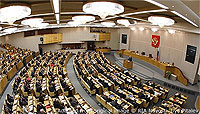Lost in the Crowd
Dozens of New Parties Could Ultimately Bolster United Russia's Chances in Future Elections
Andrew Roth - Russia Profile - russiaprofile.org - 3.22.12 - JRL 2012-55
With the passing of a new law easing restrictions on registering political parties, more than 100 new parties are expected to form before Russian parliamentary elections next year. The free-for-all includes liberals, nationalists, environmentalists and a large number of social-democratic parties as well. Yet questions remain about how those parties will coordinate their activities with one another and whether laws will permit them to form coalitions. If parties don't find a way to channel votes toward a single party or coalition, many of those new parties will still find themselves outside of Parliament come next December.

file photoMikhail Gorbachev, who presided over the dissolution of the Soviet Union as the last leader of the Communist Party, has played a marginal role in politics in Russia for many years now. Yet this week at a press conference he announced that he wanted to help revive the Social-Democratic Party, which he founded in 2001 and then abandoned in 2004. While Gorbachev said he would not lead the party, he appealed to social-democrats to write him with ideas to help revive the "social-democratic project" in Russia. "In Russia right now there is a lot of confusion in the party structure, and a social-democratic party could unify enormous groups," he told reporters.
Gorbachev isn't the only one with a new party in the works. Oligarch Mikhail Prokhorov announced his intention to found a new party even before he made a strong showing in the March presidential elections, winning close to eight percent of the vote. The party, which he said would be founded on "non-political principles," has begun choosing regional leaders on the basis of popularity and not ideology (the party still doesn't have a name, but anyone can propose one and vote for it online). Yet Prokhorov will have plenty of competition: more than 60 parties have already announced plans to form, many opposed to both President-elect Vladimir Putin and his ruling United Russia Party. They include politicians, like Boris Ryzhkov's new Republican Party, former Deputy Energy Minister Vladimir Milov's Democratic Choice Party, an environmental party under the influential former Moscow prefect Oleg Mitvol and a nationalist party formed by the "Russian" movement.
The explosion in the number of parties is a result of a law proposed by President Dmitry Medvedev, which will reduce the number of members required to register a political party from 40,000 to 500. For parties nominating candidates for presidential elections, the government now requires 100,000 signatures instead of the previous two million. Signature requirements led to contentious disqualifications in this year's presidential elections, when Grigory Yavlinskiy from the liberal Yabloko Party was banned from the ballot, and in December's parliamentary elections as well.
Yet there are concerns over the new laws and the flood of new parties onto the Russian political scene. The Russian State Duma maintains a five percent barrier for entrance into the Parliament any party that receives less is given no representation in the P